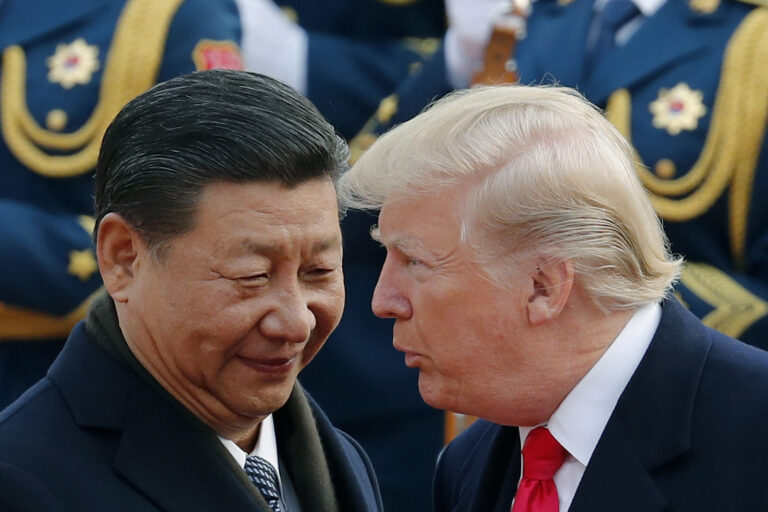The latest round of trade talks between the U.S. and China concluded in Stockholm on Monday without much headway in the trade war between the world’s two largest economies.
While U.S. negotiators continue to use tough rhetoric, including the threat of secondary sanctions to discourage China from fueling Russia’s war against Ukraine, geopolitical analysts say President Donald Trump’s administration is at a disadvantage in the negotiations.
Newsweek has contacted the White House for comment via email.
Why It Matters
Trump dramatically escalated economic tensions in April. Citing unfair Chinese trade practices and promising to revitalize U.S. manufacturing, he announced heavy tariffs on Chinese goods. The move rattled global supply chains and prompted swift retaliation from Beijing, which introduced its own tariffs and a suite of other tit-for-tat measures.
Li Chenggang, the Chinese vice minister of commerce and international trade representative, told state media the discussions had been “candid” and that the two sides would push to extend the 90-day pause agreed to in May on the most severe tariffs.
Treasury Secretary Scott Bessent, who led the U.S. negotiating team in Stockholm, called the talks productive but said an extension of the trade truce—currently set to expire August 12—was for the president to decide.

Andy Wong/Associated Press
Concessions
Trump has already surrendered too much negotiating power in his pursuit of a sweeping deal with China, critics say.
This includes the administration’s recent decision to reverse restrictions on exports of Nvidia’s H20 chips.
The H20 is one of many chips to be restricted in a bid to slow China’s progress in artificial intelligence—viewed by Washington as a national security threat given Beijing’s policy of military-civil fusion.
Additionally, the U.S. Commerce Department has been instructed to hold off on imposing new export controls on China, in what officials describe as an effort to keep trade talks on track, the Financial Times reported on Tuesday, citing both former and current U.S. officials.
Other alleged concessions center on Taiwan, the self-governed island that China claims as its territory and has vowed to unify with, by force if necessary.
The Trump administration has blocked Taiwanese President Lai Ching-te from making a brief stopover in New York during a planned trip to visit Taiwan’s diplomatic allies in Latin America, according to the Times, which cited multiple sources.
Both Lai’s predecessors and Lai himself in his previous role as vice president were permitted to make brief stopovers in the U.S., during which they met with supporters and officials.
A separate report from the British paper said a planned meeting between the Taiwanese Defense Minister Wellington Koo and the U.S. Under Secretary of Defense for Policy Elbridge Colby was canceled at the last minute last month.
Newsweek was unable to independently confirm either of these reports.
The move sparked criticism from prominent China watchers, who warned against using the self-ruled democracy and key trade partner as a bargaining chip.
Liu Pengyu, a spokesperson for the Chinese Embassy in Washington, D.C., told Newsweek that he was not aware of the details of the reports.
He reiterated Beijing’s firm opposition to visits to the U.S. by Taiwanese leaders, invoking the “one China” policy—which holds that the government in Beijing is the sole legal government of China.
“The cancellation of President Lai’s transit, paired with the Trump administration’s decision to allow Nvidia to sell its H20 inference chip to Chinese customers and to freeze planned export controls, suggests that the administration is pausing any actions that China may find offensive in favor of setting the table for a meeting between Trump and Xi,” David Sacks, a fellow for Asia studies at the Council of Foreign Relations, wrote in an analysis for the think tank.
China’s concessions during the talks have been limited by comparison. They include designating two more chemicals as precursors to fentanyl, the powerful opioid behind the U.S. overdose crisis that has become a sticking point in bilateral ties—with Washington pressing Beijing to do more to stem the flow of the drug into the U.S.
Following the first round of talks in May, China also announced it would ease some restrictions on rare earth magnets imposed in retaliation for Trump’s tariff salvos in April. The U.S. and other countries continue to complain about delayed shipments.
China dominates both the mining and refining of rare earth elements, a group of metals essential for producing high-tech components such as electric vehicle motors and missile guidance systems.
‘Miscalculation’
The Trump administration’s miscalculation—or misunderstanding—of the impact of these export controls—is one reason China gained the upper hand in the trade talks, George Magnus, an associate at the University of Oxford China Centre and former chief economist at UBS Investment Bank, told Newsweek.
“The second is that Trump is bending over backwards to get a deal with China,” he said, drawing a comparison to the “phase one” deal reached during Trump’s first term that saw China commit to purchasing some $200 billion in additional U.S. goods and services but only partially follow through on.
“The first of these [reasons] is fundamental; the second is just about flattery,” Magnus went on. “Trump is selling his country short by focusing on the second.”
Trump administration officials have suggested that an in-person meeting between the president and his Chinese counterpart, Xi Jinping, is likely by the end of the year.
On Monday, Trump wrote on Truth Social that he would consider this only if Xi extended an invitation, adding, “otherwise, no interest!”
Chinese officials have so far not issued a public statement on a summit, leading U.S. analysts to suggest Xi hopes to extract more deliverables first.
Update 7/30/25, 2:01 p.m. ET: This article has been updated with a comment from George Magnus and additional information.


